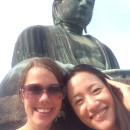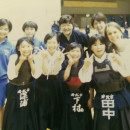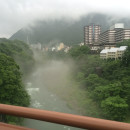Jamazing, sorry too cheesy Past Review
By Heather C (Communication Sciences & Disorders, The University of Texas at Austin) - abroad from 05/29/2014 to 07/13/2014 with
IES Abroad: Tokyo - Tokyo Summer
I learned that I can survive out in the world on my own and I'm capable of making friends from other countries without knowing the language fluently. I'm also way better with directions than my mom ever thought I was. It's exactly what I wanted and I've wanted to go to Japan since middle school.
Review Photos





Personal Information
| How much international exposure did you have prior to this program? | 1 month - 6 months |
Review Your Program
|
* Overall educational experience
Academic rigor, intensity, resources, etc. |
In JP 300 the class wasn't too time consuming, but expect to spend at least an hour or so on homework during the weekdays. For the everyday kanji quizzes you just had to put in the effort and you'd be fine which I thought was fair. We actually had 3 different Japanese teachers so we got to experience different teaching styles. They were always willing to answer questions and give an explanation while still just using Japanese. If you just put in some effort, pay attention in class, and go to class, you should be fine. I had to study a lot for the 2 tests though. |
|
* Host Country Program Administration
On-site administration of your program |
Oh my gosh the IES staff were amazing. I'm not sure if the staff is the same each year, but they were great! One of the staff even went to the hospital with me and let me try speaking Japanese to the doctor and would only step in when I really couldn't understand. The RAs were only a bit older than the rest of us but I had a lot of respect for them because of how much Japanese they had learned and how much they were willing to help. They helped with finding good places to eat, buying tickets at a convenient store, learning to use the trains, how to send your luggage to the airport, and the list goes on and on. Someone was always available and willing to help. They were so great! |
|
* Housing:
How satisfied were you with your living arrangements? |
Well the room was very small but if you're in Tokyo you won't want to be in your room much anyway. You live in a dorm so you get the chance to interact with people. Lots of people would hang out in the various common rooms eating together, studying together, or watching tv. The best part though is the location itself in the Olympic Center right next to Yoyogi koen, one of my favorite places to hang out in Tokyo, especially because it's free. You can access so many places from that area, I couldn't think of a better place to be. My one complaint is that my room had a bit of mold in it, but as soon as I notified the staff they took care of it (yet again amazing IES staff). |
| * Food: |
Tokyo is expensive, but you can totally get by. IES provides coupons that you can use in the Olympic Center but you will probably get tired of that small selection of foods fast. There's a lot or cool places near by to try Japanese food. Convenient store bentos are cheap as well but get old pretty fast. But it is possible to find 5 dollar meals. But the ramen in Japan is so good that I was totally fine spending 8 dollars or so on it. |
|
* Social & Cultural Integration:
How integrated did you feel with the local culture? |
This aspect totally depends on the actions of the student. If you want to hang out with only English speakers, you can do that. If you want to meet random Japanese people, you totally have the ability to just walk up to someone. A good place to do that is in Yoyogi park. People were generally excited to speak with me because I'm a foreigner learning Japanese. Also IES pairs you up with a Japanese speaker who is learning at the beginning of the program so it's like a language exchange. There was also an optional home stay portion of the trip where you get to really experience more of a rural Japanese home and it was times like that when I absolutely couldn't use English that I felt the most integrated with the local culture and also when my Japanese improved the most. |
|
* Health Care:
How well were health issues addressed during the program? |
I actually got a pretty bad throat infection that I usually get when the seasons change and didn't have any access to antibiotics so I had to go to the doctor. An IES staff member found one for me and went with me. The price was less than $100 so I didn't use the IES provided insurance. It was a relatively quick process and speaking in Japanese with the doctor was a good experience (if you have a hard time with Japanese the IES staff members will help translate for you in that situation). I got my prescription and medicine next to the hospital and was fine in a few days time. |
| * Safety: |
I never really felt unsafe because I made sure not to travel alone at night as a female. As everyone probably says, Japan is a really safe country. |
| If you could do it all over again would you choose the same program? |
Yes
|
Finances
|
* Money: How easily were you able to live on a student's budget?
(1 = not very easy/$200+ on food & personal expenses/week, 2.5 = $100/week, 5 = very easily/minimal cost) |
It's Tokyo. Also there are a lot of cool, albeit expensive things to buy in Japan. There are also a lot of cool free things to do. |
| Not including program expenses, about how much money did you spend on food and other expenses each week? | It depended on the week, like if I went shopping |
| Do you have any general money-saving tips for future study abroad participants? | There's a cool 24 hour cafe near the Olympic Center where you can totally get a meal 5 dollars or so. Hang out in the park and play sports with people. |
Language
| * Did your program have a foreign language component? | Yes |
|
How much did the program encourage you to use the language?
0 = No encouragement, 5 = frequent encouragement to use the language |
All the time. The teachers even have you do interviews during weekend trips. It was great. |
| How would you rate your language skills at the beginning of the program? | Intermediate |
| How would you rate your language skills at the end of the program? | Intermediate |
| What was the highest level language course you had completed prior to departure? | Intermediate or so |
| How many hours per day did you use the language? | |
| Do you have any tips/advice on the best ways to practice the language for future study abroad participants? | Ask for directions in Japanese. Even if you already know the way there, it's good practice and it might spark a cool conversation. Most people will want to know where you're from and you'll have that explanation down perfectly in Japanese by the end of the trip. There's a barrier to at first if you're not used to using the language, but if you just keep trying eventually it goes down and you can feel the difference in your confidence level. At first I think it's really easy to be nervous and want to give up and speak slowly/mess up a lot, but you have to go through that phase to get better. And the coolest part is that Japanese people are excited generally that you are learning Japanese so they will be encouraging. It's also nice when they use easy words and speak slowly. |
Other Program Information
|
* Where did you live?
Select all that apply |
|
|
* Who did you live with?
Select all that apply |
|
|
* Who did you take classes with?
Select all that apply |
|
| About how many local friends did you make that you will likely keep in touch with? |
A Look Back
| * What did you like most about the program? |
|
| * What could be improved? |
|
| * What do you know now that you wish you knew before going on this program? | I wish I knew about pocket wifi. Starbucks free wifi and the wifi in the dorms is not good enough, especially when you're out exploring and want to find that super cool hidden spot. |








